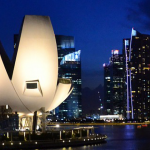As the financial crisis wreaked havoc across the globe, the appeal of pursuing an MBA in a country with a promising economic future led many students to look East.
Singapore saw an 18-percent growth in its economy in the first six months of 2010, with the biggest expansion in the financial and tourism sectors. It is also boasts several world-ranking MBA programs.
One of the most famous is INSEAD, which opened its Singapore campus ten years ago. Kara Keenan, associate director of admissions, has seen increasing interest from students wanting to take advantage of the Asian perspective.
“In the last few years the numbers of people wanting to start in Singapore has grown consistently,” says Keenan. “Ten years ago, we maybe had to do a little bit of convincing to get people to come to Singapore, but that doesn’t exist any more.”
Quite the opposite. Now the school runs “basically at max capacity,” and is seeking to expand its Singapore facilities to accommodate more students. Keenan attributes this growing demand to the increased exposure of the INSEAD brand, but also to global economic trends.
“Over the last ten years Asia has really become a hotspot for economic growth, and I think Westerners who ten or twenty years ago wouldn’t have considered a career in Asia are really thinking about it now.”
Mihir Mohite is in the final semester of the MBA at National University of Singapore (NUS) Business School, which with Nanyang Technical University (NTU), is one of the country’s two AACSB-accredited programs. Having worked for several years as a financial analyst for UBS in the United States, Mohite decided on the NUS MBA at the height of the financial crisis.
[See also: MBA School Choice: NUS Vs. Nanyang]
“I could see that the job situation in the United States was not looking very good at that time,” says Mohite. “UBS itself has its operations in Singapore, so I knew from experience that there was a lot going in Singapore with regards to finance and that these economies are doing pretty well.”
[Read: Working in Singapore after an MBA There]
But should Mohite decide to return to the US upon graduation, he is confident that the experience he has gained in Singapore will not be wasted.
“A lot of businesses in the United States are multinationals that are looking to expand into Asia,” he says. “Someone with an insight into Asian culture and Asian business practices would definitely be able to add value to such a company.”
David Tipton, pursuing an MBA at NTU, agrees.
“From a professional standpoint, everybody in the West wants to do business in Asia, but very few people from the West are actually educated in Asia,” says Tipton. “So that was one of the reasons I wanted to do an MBA over here.”
Offering the chance to work on Asian case studies in a country where English is one of the official languages, it's no wonder that the city-state has huge appeal as a gateway to the East for many Western business students.
For Tipton the one of the main advantages at NTU has turned out to be the diverse cohort of students with whom he studies.
“From a textbook standpoint, I think the programs here in Singapore is very similar to the programs you’d find in the United States,” says Tipton.
“We’re using basically the same books, but the cultural experience of being here is unreplicatable anywhere, I think. I’m learning more about different cultures than I ever thought possible.”
This broad demographic is replicated at INSEAD, where more than 80 different nationalities are represented in their 2010 MBA cohort.
And the city-state itself offers a very diverse cultural climate, as Mohite has discovered.
“Singapore has four official languages, and besides, there are a large number of expatriates who come here to work,” says Mohite. “So it’s a very cosmopolitan life here.” And all this leaves aside the fact that Singapore boasts Asia's highest quality-of-life ranking, has a year-round warm climate and delicious cuisine. Mohite has been particularly impressed with the way the city-state is run.
“It has a very effective government and you can see the effects of that everywhere in the form of a very effective infrastructure, very good public transport, and very good facilities in general for citizens.”
When INSEAD opened its Singapore campus ten years ago, it may have been considered a brave move, but other schools have since launched Singapore-based MBA pograms of their own – a notable example being Rutgers EMBA in Energy Management, which began in January 2008.
Others, like BI Norwegian School of Management’s EMBA are run in partnership with business schools in Singapore – in this case NTU.
The Singaporean government has also done its bit to boost the country’s standing as top-class destination for international MBA students. The government-founded Singapore Management University also celebrates its tenth anniversary this year.
With a population of just four million, Singapore has more than its fair share of quality MBA programs and a unique global perspective. As Tipton enthuses about his experiences in the city-state, “It’s been everything I thought it was going to be and a whole lot more.”
Image: chensiyuan / Creative Commons (cropped)










